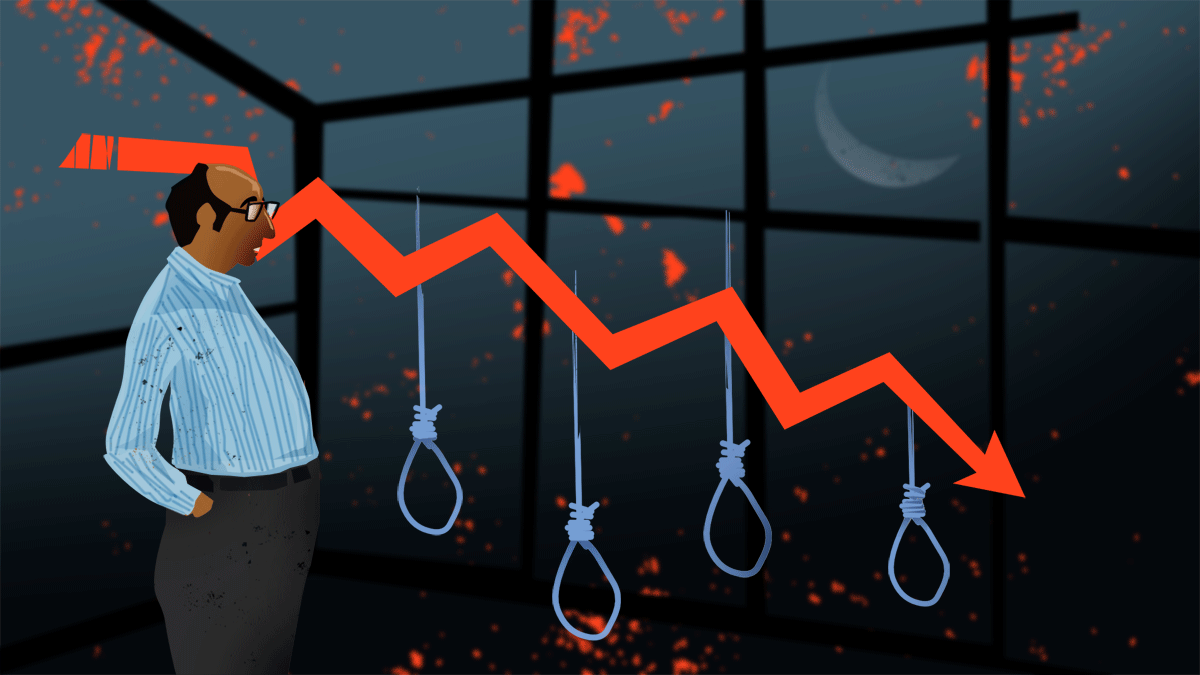In the past 10 years, over 500 PSB officers have died by suicide.
When targets are overwhelming, senior management and customers are both impatient, and there is constant fear.
Not every banker has the resilience to survive and thrive, warns Tamal Bandyopadhyay.

Illustration: Dominic Xavier/Rediff
This is an apocryphal story. In the summer of 2009, at a pre-kindergarten school at Santa Barbara, California, the director asked the students to introduce themselves — a ritual to kick off the academic year.
The students were children of doctors, lawyers, scientists, businessmen…
When a three-year-old girl sheepishly said, “My dad is a pole dancer”, there was a pindrop silence. The director hugged the little kid, kissed her, and was all praise for her boldness, given the social stigma the profession carried.
Before leaving the class, the kid whispered into the director’s ears: “Miss, I lied. My dad is a banker.”
Post the 2008 Lehman crisis, banking was not a profession of pride in the US. In India, too, it seems to be becoming difficult, though for different reasons.
July 19 was Bank Nationalisation Day — the day 14 banks with 85 per cent of overall deposits were nationalised in 1969.
Earlier that month, two days ahead of it, a 52-year-old chief manager of the Baramati branch of a large public sector bank in Pune killed himself.
He had resigned on July 11, citing health concerns and unbearable workplace stress, and was serving the 90-day notice period.
In his suicide note, he wrote that all bank officials were working to the best of their abilities and urged the management to take a more sympathetic view towards the staff.
Last year, another PSB’s branch manager at Arakkonam, Tamil Nadu, hanged himself in his home on his birthday after dropping his wife to work.
He, too, blamed work pressure and unbearable toxic culture.
In 2023, the manager of the Hindu Colony branch of another government-owned bank, died by suicide, jumping off from his ninth-storey flat.
He left behind a suicide note, saying he was forced to end his life because of the managing director of a company who had taken a loan.
In the past 10 years, over 500 PSB officers have died by suicide.
The World Health Organisation estimates that about 727,000 people die by suicide annually worldwide. A 2021 data puts the global suicide rate at 8.9 per 100,000 population. That’s one suicide every 43 seconds.
In India, the National Crime Records Bureau (NCRB) reported 170,924 suicides in 2022 — a 4.2 per cent increase from the previous year and the highest since 1967. At 12.4 per 100,000, India’s suicide rate is higher than the global average.
Worldwide, construction and extraction workers such as miners and builders have a far higher rate — around 53 per 100,000.
As do healthcare professionals like physicians, dentists, and veterinarians (28 to 40 per 100,000).
Other high-risk groups include police officers, financial services workers, and manual labourers.
The NCRB data categorises suicides by broad occupational groups.
In 2022, for when last data is available, maximum suicides were reported among daily wage earners (26 per cent), followed by homemakers (14 to 15 per cent), the self-employed (11 per cent), the unemployed (9 to 10 per cent), professionals/salaried persons (10 per cent), students (8 per cent), and farmers (7 per cent).
Bankers fall in the category of professionals/salaried persons, which overall recorded about 17,000 suicides in 2022.
A common thread runs through suicides by bankers in India. Many of these suicides were in the bank’s branch, and those who took the extreme step were mostly branch managers or those attached to the branches in different capacities.
What is pushing PSB branch managers over the brink?
Financially, public sector bankers are reasonably well looked after. Only those at the top of the pyramid, such as managing director-cum-chief executive officers and executive directors of PSBs, earn much less than their private sector counterparts.
The rest, who form the largest chunk of PSB employees, typically earn more than their private peers.
Besides, there is job security. Unless implicated in serious fraud or corruption, they don’t lose their job. They are protected by service rules.
So, they should enjoy a healthy work-life balance. Yet, many employees suffer from depression, with some ending up taking the extreme step. Why?
One might argue that there are employees in every field who cannot cope with work pressure.
Top officials of such banks might also argue that banks need to meet the expectations of customers in terms of service, of investors in terms of creating stock market value, and, of course, the targets set by the senior management, or even the finance ministry.
Relentless pressure from the top without empathy and adequate support from senior colleagues are having catastrophic consequences.
Adding to the performance pressure is the toxic work culture in many PSBs. It’s a deadly cocktail, which can kill motivation and create manic depression.
Branch managers are the nodal points in a PSB’s hierarchy. They are accountable for business outcomes and meeting various targets.
They are expected to generate interest income through higher lending, while running the risk of creating bad assets if the credit appraisal is not done properly.
They also need to recover bad loans of the past. Yet another challenge is garnering low-cost deposits to bring down the cost of funds.
There is no escaping these integral parts of banking. But it doesn’t end there. The officers at branches need to also sell third-party products — insurance policies and mutual funds for fee income.
Both the banking regulator and the Department of Financial Services in the finance ministry have expressed reservations over this practice, but third-party sale continues.
On top of all this, bankers are subject to vigilance scrutiny. Vigilance officials frequently visit branches for preventive checks.
And then, many branches are understaffed, and frequent IT downtime and disruptions in services expose the employees to public anger and mistrust.
Until some years ago, banks could make their borrowers happy by sanctioning and disbursing a personal loan within a week.
Today, if they take a couple of hours, the frustrated borrower may well walk out of the bank.
In an environment where targets are overwhelming, senior management and customers are both impatient, and there is constant fear, not every banker is equipped with the resilience to survive and thrive.
Burnout, mental health issues, and, in some cases, the not-so-transparent policies on transfer and postings lead to depression.
Reaching out to mental health professionals can help, but where’s the time when they are always worried about missing the targets.
I interacted with a dozen-odd branch managers of various PSBs in Mumbai recently. Besides the issues mentioned above, abusive superiors also seemed to be a reason for the rise in suicides by bankers.
Some video clips featuring such bosses are in the public domain. Listen to their language and you will understand why temperatures run so high in a bank’s branch even during the Mumbai monsoon.
The troika of unrealistic targets, long working hours, and lack of support from seniors is affecting the work environment.
Excessively long tenures of some whole-time directors, too, can spoil the work culture.
It is not unusual to find employees trapped between the pressure to meet targets and often manipulative superiors.
PSBs have been playing a stellar role in the Indian economy’s growth. It’s time for soul-searching. They need to change the culture. It’s not a job the HR department can do.
The boardrooms must look closely at what ails employees, reassess business targets, ensure adequate staff, and extend mental health support — before it is too late.
PS: Every PSB does not have the kind of culture I have mentioned. There are those who care for their employees.
But, a few bad apples spoil the sack. The same can be said for some private banks.
Feature Presentation: Aslam Hunani/Rediff



